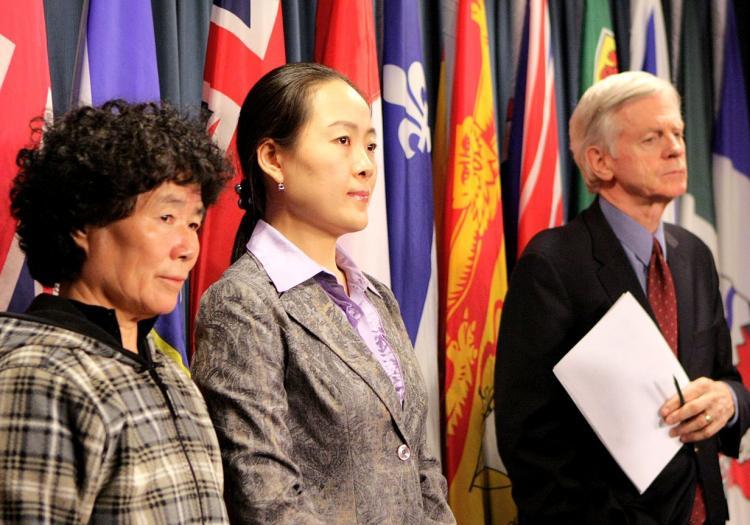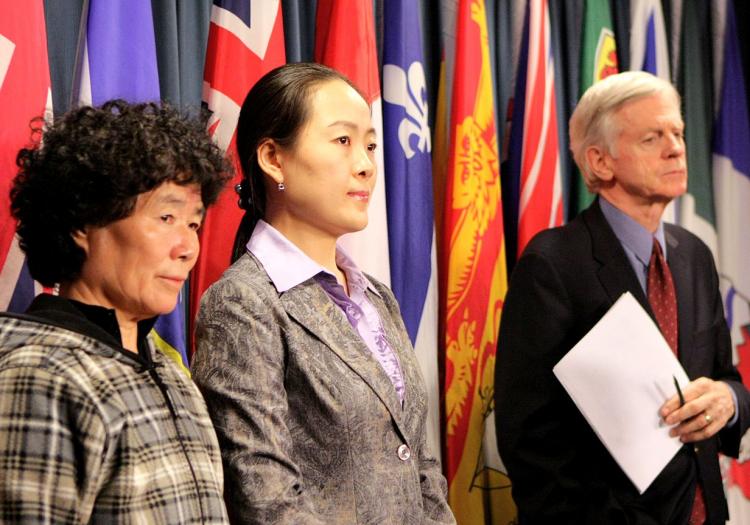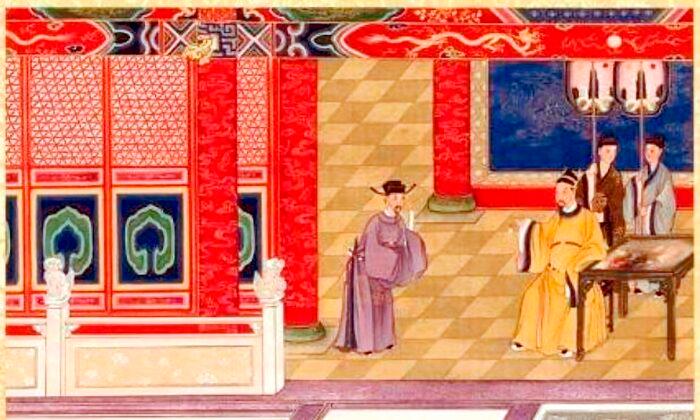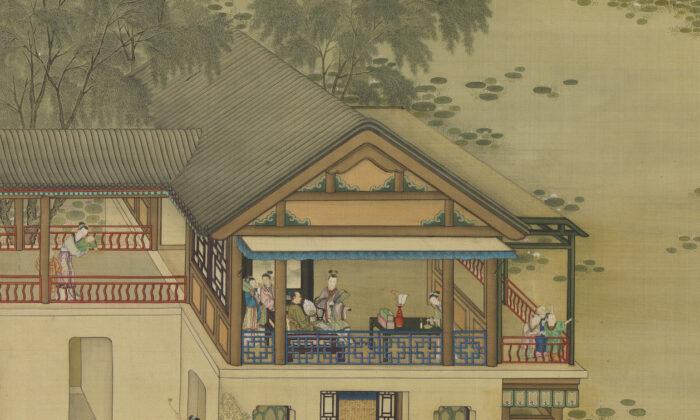Amid Canada’s trade mission to China during which Trade Minister Stockwell Day had said that human rights would be discussed, the Chinese regime has issued a human rights action plan.
But Canadian activists say they’re looking for prisoners’ release and other concrete progress rather than promises on paper.
A key area for progress, they said, would be for the regime to stop persecuting human rights defenders themselves, such as rights lawyers.
On April 13, the day the regime launched the plan, Chengdu public officials reportedly violently beat Beijing lawyer Cheng Hai on his way to see the mother of an imprisoned Falun Gong practitioner he is defending.
Dermod Travis, executive director of the Canada Tibet Committee, said the new plan “could be called whitewashing.”
“We’ve seen in the past from China a tendency to put forward great words that they fail miserably at living up to. We certainly saw this with the commitments that they made to the International Olympic Committee in order to win the Olympic Games in 2008.”
Instead of fulfilling its promise to improve human rights, media and rights organizations worldwide reported deterioration in people’s rights and freedoms ahead of the Beijing Olympics.
“We do have to raise concerns about the lack of civil and political rights focus in the document,” said Lindsay Mossman, Amnesty International Canada’s campaigner with responsibility for human rights in China.
“We’d like to see, for example, reforms ensured that human rights activists are not detained arbitrarily, that they’re not harassed, and certainly the release of prisoners of conscience. Those are the kinds of things that should be outlined in the plan with concrete targets as have been set out for some of the other areas.”
The 54-page two-year national action plan emphasized priority on “rights to subsistence and development,” setting out targets in areas such as employment, housing, social security, healthcare, and education.
Uyghur Canadian Society President Rukiya Turdush expressed hope for the people of China but “hopelessness” for the Uyghurs of the Xinjiang region in northwestern China. She said she doesn’t believe the plan will be implemented in Xinjiang.
Former Secretary of State (Asia-Pacific) David Kilgour pointed to the torture of human rights lawyer and Nobel Peace Prize nominee Gao Zhisheng.
Mr. Gao was tortured for more than 50 days in 2007 after writing an open letter to the U.S. Congress on the state of human rights in China in the run-up to the Beijing Olympics. The torturers shocked him with electric batons all over his body, including his mouth and genitals, and also pierced his genitals with toothpicks.
Mr. Gao was again taken from his home by more than ten security agents on February 4. His current whereabouts are unknown.
Mr. Kilgour and Winnipeg-based international human rights lawyer David Matas published a report in 2006-2007 documenting evidence of Chinese state-sanctioned organ harvesting from imprisoned Falun Gong practitioners. Despite multiple requests by United Nations special rapporteurs, the regime continues to deny illicit organ harvesting and refuses independent investigations in the country.
Mr. Travis sees nothing “standing out” in the action plan about the rights to a fair or open trial and the rights to legal counsel, religious freedom, and peaceful assembly.
Just last week two Tibetans were sentenced to death for their alleged roles in last year’s uprising, he said.
“Last year, when a number of Chinese lawyers volunteered to defend Tibetans from charges arising from the uprising, it became abundantly clear that the government of China would not permit them to defend the Tibetans and they had to withdraw from the cases,” he said.
China has about 340 labour camps where an estimated 250,000 prisoners perform forced labour in “terrible conditions, half of whom are estimated to be Falun Gong practitioners,” said Mr. Kilgour.
“You cannot put out a 50-page statement like that and have any credibility if you’re going to keep these forced labour camps open. Those camps are perhaps the most blatant example of the fact there is no rule of law in China, because you can be sent to these camps without any trial or any proceeding for up to four years.”
Mr. Day is in China from April 10 to 17. The trade mission has so far seen the launch of science and technology research initiatives, construction contracts, reconstruction plans in the earthquake-devastated region of Sichuan, and new Canadian trade offices.
Mr. Travis said that while Mr. Day has indicated plans to address human rights issues in China, “what we’re also looking for is actually to see progress on these issues.”
But Canadian activists say they’re looking for prisoners’ release and other concrete progress rather than promises on paper.
A key area for progress, they said, would be for the regime to stop persecuting human rights defenders themselves, such as rights lawyers.
On April 13, the day the regime launched the plan, Chengdu public officials reportedly violently beat Beijing lawyer Cheng Hai on his way to see the mother of an imprisoned Falun Gong practitioner he is defending.
Dermod Travis, executive director of the Canada Tibet Committee, said the new plan “could be called whitewashing.”
“We’ve seen in the past from China a tendency to put forward great words that they fail miserably at living up to. We certainly saw this with the commitments that they made to the International Olympic Committee in order to win the Olympic Games in 2008.”
Instead of fulfilling its promise to improve human rights, media and rights organizations worldwide reported deterioration in people’s rights and freedoms ahead of the Beijing Olympics.
“We do have to raise concerns about the lack of civil and political rights focus in the document,” said Lindsay Mossman, Amnesty International Canada’s campaigner with responsibility for human rights in China.
“We’d like to see, for example, reforms ensured that human rights activists are not detained arbitrarily, that they’re not harassed, and certainly the release of prisoners of conscience. Those are the kinds of things that should be outlined in the plan with concrete targets as have been set out for some of the other areas.”
The 54-page two-year national action plan emphasized priority on “rights to subsistence and development,” setting out targets in areas such as employment, housing, social security, healthcare, and education.
Uyghur Canadian Society President Rukiya Turdush expressed hope for the people of China but “hopelessness” for the Uyghurs of the Xinjiang region in northwestern China. She said she doesn’t believe the plan will be implemented in Xinjiang.
Former Secretary of State (Asia-Pacific) David Kilgour pointed to the torture of human rights lawyer and Nobel Peace Prize nominee Gao Zhisheng.
Mr. Gao was tortured for more than 50 days in 2007 after writing an open letter to the U.S. Congress on the state of human rights in China in the run-up to the Beijing Olympics. The torturers shocked him with electric batons all over his body, including his mouth and genitals, and also pierced his genitals with toothpicks.
Mr. Gao was again taken from his home by more than ten security agents on February 4. His current whereabouts are unknown.
Communist Party and Human Rights ‘Totally Opposed’
Mr. Kilgour said that as long as the communist party rules in China, there will not be respect for human rights and freedoms.
“Since 1949 the party has been doing its utmost to destroy all of those [rights and freedoms]—what we take for granted in rule-of-law countries. The two are totally opposed.”Mr. Kilgour and Winnipeg-based international human rights lawyer David Matas published a report in 2006-2007 documenting evidence of Chinese state-sanctioned organ harvesting from imprisoned Falun Gong practitioners. Despite multiple requests by United Nations special rapporteurs, the regime continues to deny illicit organ harvesting and refuses independent investigations in the country.
Mr. Travis sees nothing “standing out” in the action plan about the rights to a fair or open trial and the rights to legal counsel, religious freedom, and peaceful assembly.
Just last week two Tibetans were sentenced to death for their alleged roles in last year’s uprising, he said.
“Last year, when a number of Chinese lawyers volunteered to defend Tibetans from charges arising from the uprising, it became abundantly clear that the government of China would not permit them to defend the Tibetans and they had to withdraw from the cases,” he said.
China has about 340 labour camps where an estimated 250,000 prisoners perform forced labour in “terrible conditions, half of whom are estimated to be Falun Gong practitioners,” said Mr. Kilgour.
“You cannot put out a 50-page statement like that and have any credibility if you’re going to keep these forced labour camps open. Those camps are perhaps the most blatant example of the fact there is no rule of law in China, because you can be sent to these camps without any trial or any proceeding for up to four years.”
Mr. Day is in China from April 10 to 17. The trade mission has so far seen the launch of science and technology research initiatives, construction contracts, reconstruction plans in the earthquake-devastated region of Sichuan, and new Canadian trade offices.
Mr. Travis said that while Mr. Day has indicated plans to address human rights issues in China, “what we’re also looking for is actually to see progress on these issues.”






Friends Read Free